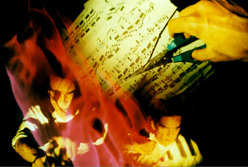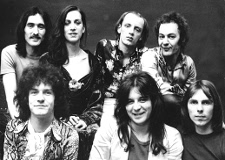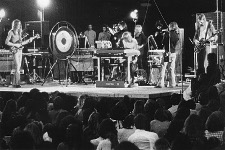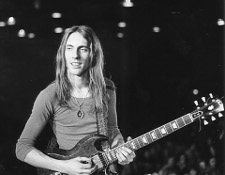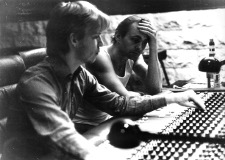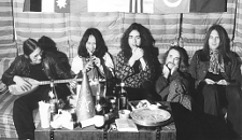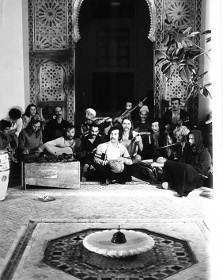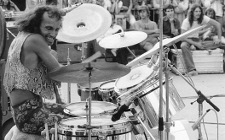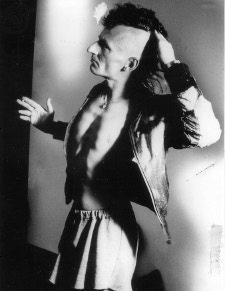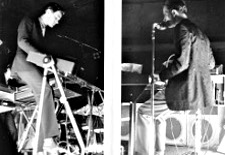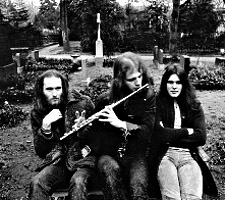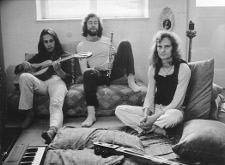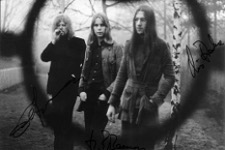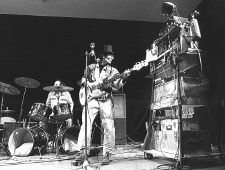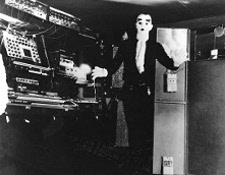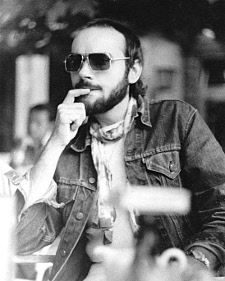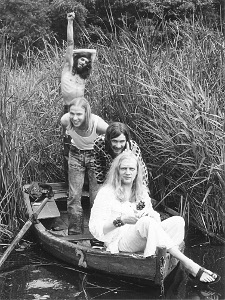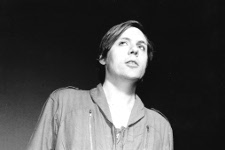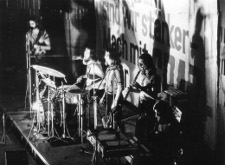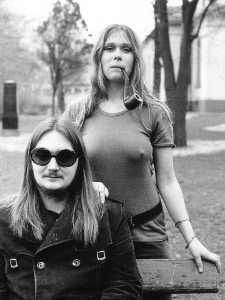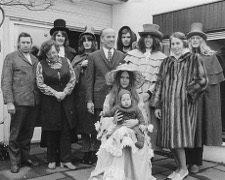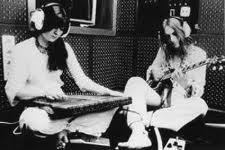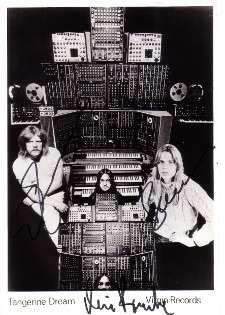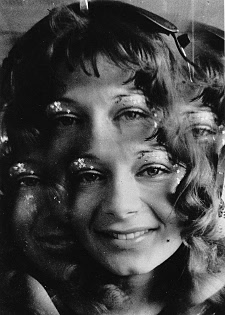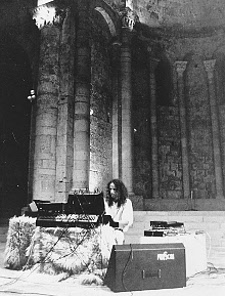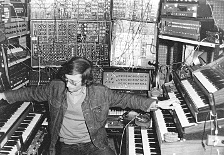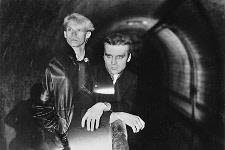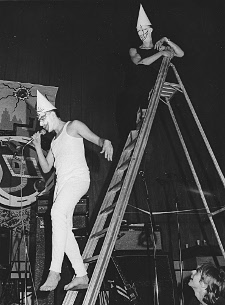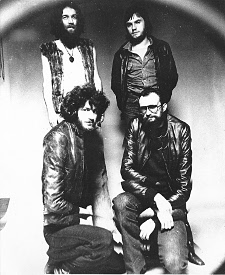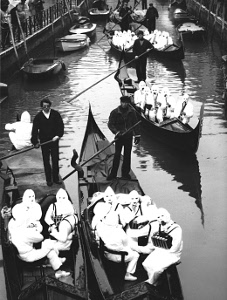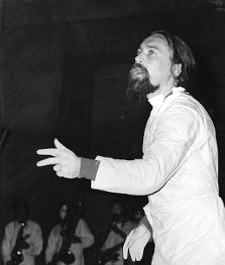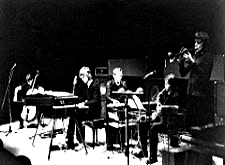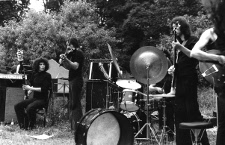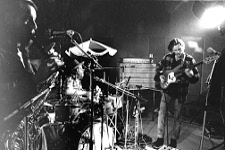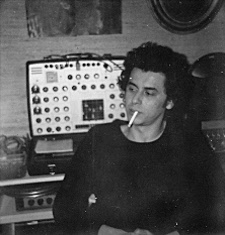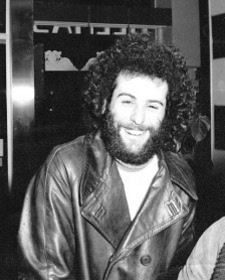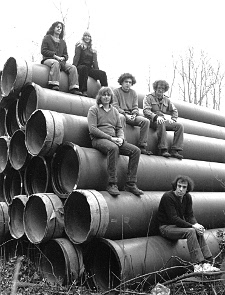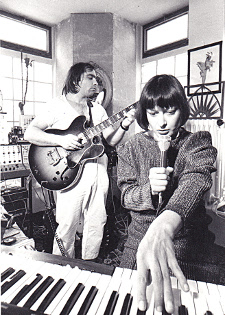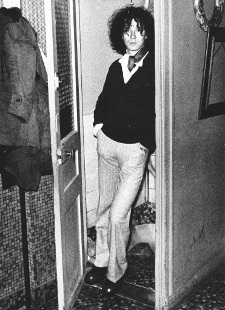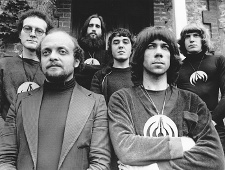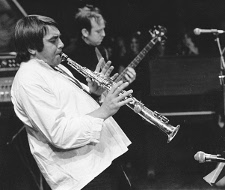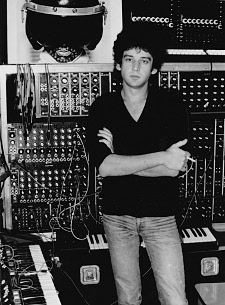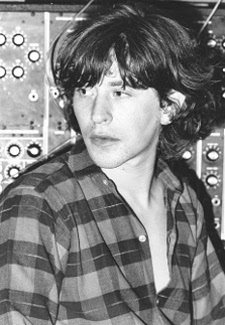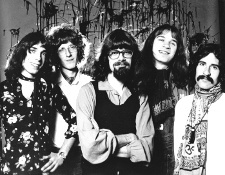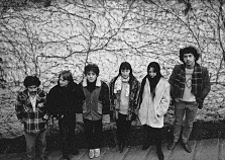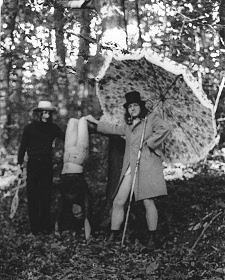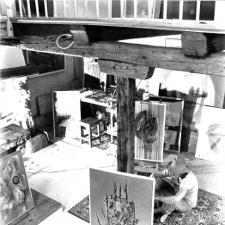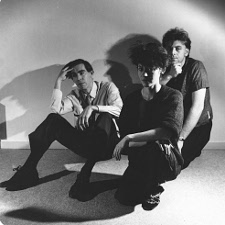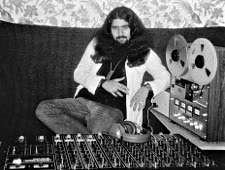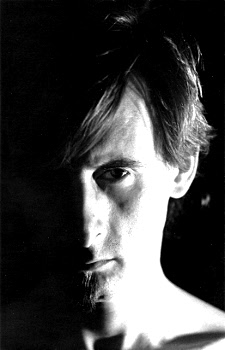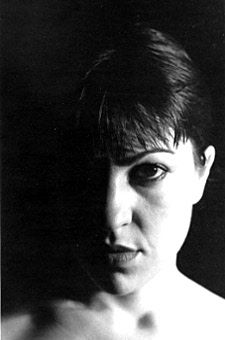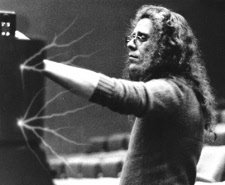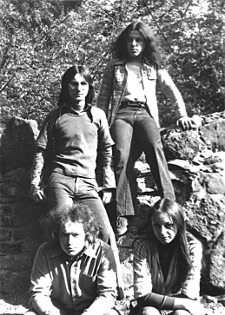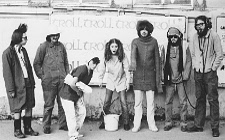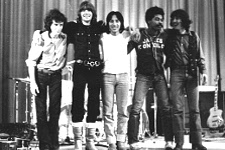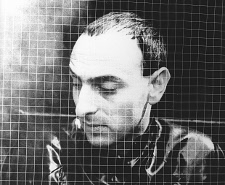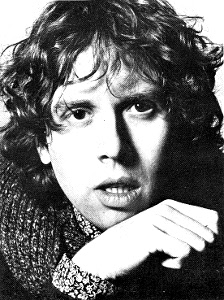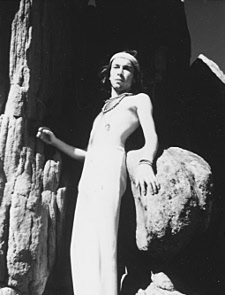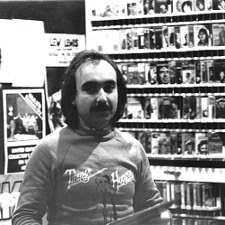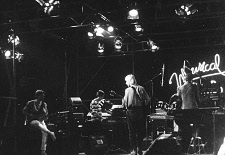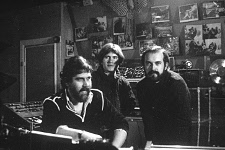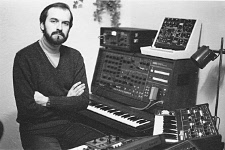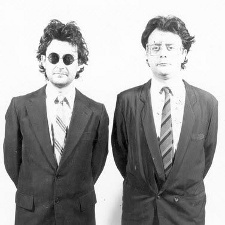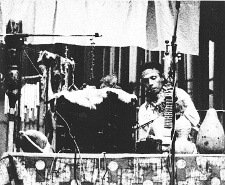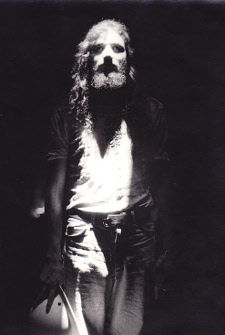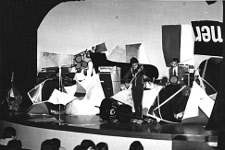The Story so far...
1970's- FM radio, Alternative Magazine & 1st US Indie Distributor of Euro Rock
1980's- D.I.Y. LP + Cassette & CD label
1990's- Distribution via the WWW
2010- Eurock.com ~ Multimedia Podcasting, Interviews & Reviews.
Label & Artist Submissions Accepted for Review...
Klassik Krautrock
Artistes Français
|
Atilla Grandpierre INTERVIEW

Q: When did you first start making music?
A: I was sixteen when with my schoolmates I went to the flat of one of us to do an experimental-avant-garde concert for ourselves. We had no musical instruments, so we used what we found in the kitchen, bathroom, etc. It was started with a vengeance, but soon turned out that the music we did was not really interesting anymore. In the long run, I tried to discover better musical ideas within myself, but what I succeeded in creating was not really rewarding. After a time it became frustrating and painful, boring and disturbing, a musical experiment without any real success.
In the meantime I traveled deeper and deeper within myself trying to discover more exciting musical worlds. Then suddenly, without realizing what I was doing, one day I stood up, started to run, into the closet standing by the wall, started to hammer on its wooden door faster and faster, at the peak of excitement a strange song broke out from me. Later on, when the explosion had finished and I returned to the awareness of the outer world, my friends told me: Atilla, we did not know that a muezzin lives within you! We had recorded the whole �concert� on tape and therefore I could listen to the song that came out of me. I was also surprised; it was something like an ancient Eastern prayer from Central Asia. I also did not know that a muezzin lived within me.
The next time it happened was at a New Year�s Eve party when a shamanistic musical spell erupted out of me, enrapturing everybody. I was overwhelmed by the magic I experienced. It took me many years, and many similar outbreaks of my deepest musical instincts from the depths of my inner self, and then a discovery of the enchanting ancient music of Mongolia until I realized that the muezzin within me is filled with the treasures of the ancient genetic memory of Hungarians, of mankind, of all living beings of the immense Universe.
I realized then that the world is much more expansive than I thought. I liked progressive rock music a lot. I had one of the five biggest collections of progressive rock music in the whole of Hungary. Listening to the songs of Ash Ra Tempel, Amon D��l I, MC5, Stooges, Blue Cheer, Brainticket, Jade Warrior, Soft Machine, Blues Image, Eric Burdon & the Animals, Spooky Tooth, Arthur Brown, The GODZ, Kex (a Hungarian visionary band of the 1970�s), Party Boys, West Coast Pop Art Experimental Band, Warsaw Village Band, Hun-Uur-Tu, Yat-Kha, etc. was for me a revolutionary experience. I felt that the best attempts of rock music broke out from the underground layer of the collective mind of people. I was able to experience life in the brightest days of European or American music. I had the possibility to see and live the peak-experiences of many people around the world, to see into their lives from a height, to see how they felt in an afternoon, when they felt inspired. This was a powerful experience. I felt as if I had grown a thousand wings!

Then I discovered the ancient folk music of Eurasia and realized that it transcends individual feelings. It speaks about the whole of a culture, a culture unifying millions of lives, having an enormous dimension filled with pain and joy, cathartic feelings leading to meaningful lives. It was a culture which was part of a spiritual exchange with the Cosmos, a revelation that life as a whole is so beautiful, and uplifting that we have to reciprocate, we have to give to Nature, to the Living Universe, the source of all our lives, the life of mankind here on Earth. From that moment on I became able to unify my self-conscious self with the muezzin within. I devoted myself to using my abilities to enhance this collective-cosmic unity of mankind and the Living Universe.
Q: Was VHK (Galloping Coroners) the first band you played in? And when was that band started?
A: Yes, VHK was my very first band. Actually, I was invited to some other bands because many friends heard me at the house parties, where � not infrequently � I used to sing and dance. And when I did, most of the people were noticing that I sing and dance much more energetically and visually than Mick Jagger or Iggy & the Stooges. But all these other bands were completely uninteresting for me.
Q: Were there any groups who influenced your musical style?
A: Yes, I liked very much early Pink Floyd and the first album of Blue Cheer: �Vincebus Eruptum�. The most important song for me was �Out of Focus�. I translated this into Hungarian as �Fallen out from the center focus of the objects�. I experienced that there is a completely unrevealed wholly fantastic living world within objects like stones, within all apparently inanimate things. They are reacting sensitively to everything, but they have a different essence from us. They live for Eternity. They do not change their face from day to day. What they feel today, they feel also tomorrow, year after year. There is a strange unique life residing within their inner world. It�s a transparent bluish colored landscape, where Life and Death swing to and fro, swing-swang, life-death, everything-nothingness, and this movement to and fro is a pure Spell. Their world is full of spells. It�s an eternity of feelings, blossoming emotions. When you break a piece of stone, you cannot unite the two parts again. A stone is living, and you cannot unite a living being simply by pushing its parts one into the other. You cannot kill a stone. All its parts continue to survive. Their life is like a hologram, in each and every piece of matter, yet in a special stone it becomes a special jewel, the inner world crystallizes into a personal face. And the personality of the stone is filled with music, waiting with utmost patience for somebody to channel its music into singing and dancing, listening to a music filled with the memory of a cosmic life, in which we are brothers and sisters.
Q: Was there any social or political philosophy VHK conveyed with their music?
A: Yes: we attempted to convey the message that all human societies should be based on the natural spirituality of the cosmic life force, in vital relations with the gigantic cosmic thread of billions of lives, lives of our contemporary fellow beings, with the community of human fate, the lives of our ancients, and all life of the Living Universe. All societies should be transformed by the full capacity of billions of lives, breaking out of their inhuman constraints, to realize a brilliant future filled with real meaning and open feelings. This future, if it did not exist, should be invented.
Q: Were the first albums self-produced, or released by a Hungarian record label?
A: The first albums were produced by Dietmar Lupfer, our first German manager. He founded a label especially for VHK: the Sonic Boom. The first record �Teach Death a Lesson� was recorded in Eindhoven, Netherland, in 1987 December 28-31. It was later on also released by a big German and Hungarian record label. Our second and third album, �Jumping Out the World Instinct� (1990) and �Hammering on the Gates of Nothingness� (1992) were also recorded in Germany and Netherland. These three records were re-released on two CDs by Jello Biafra�s legendary label �Alternative Tentacles�.
Q: Did you play lots of concerts in Hungary, and attract big audiences?
A: In the seventies, we had only a few concerts. We had countryside fame, as the wildest group of Hungary. Our fame attracted a big interest and it was very hard to find a possibility to play. But from 1980 onwards the emerging influence of the punk and new-wave movements generated a lot of similar bands in Hungary. These bands had heard for a long time about VHK and we had a legendary status for many of these new bands. We had many possibilities to play with them, and four of the most popular punk and new wave groups wrote songs about VHK, filled with enthusiasm. We attracted thousands of people. It was not uncommon that thousands of people were not able to enter to the concert hall because it was already so crowded.

Q: What about in other countries?
A: In the year 1981 Gabor Body arranged a big music festival with the Hungarian Film Company. He called it the �Smink Festival� �Make-up Festival�. He invited the greatest new music groups to compete. VHK won the Festival; they declared that we had shown the most understanding about the �monumental drama of the 20th century�. Our performance was recorded on video and the film was shown in the West German Television multiple times. VHK became a legendary band in West Germany.
In the year 1982 legendary film director Gabor Body, also made a film featuring me and VHK titled �Dog�s Night Song�. The film was shown in West-Berlin, and we were invited by a West-Berlin group �Die T�dliche Doris� to play in West-Berlin. We played in the Front Kino in January 1984. The club was incredibly full, and the audience was completely shocked and overwhelmed. Some of them were crying mesmerized by the unexpected shock of the so long forgotten completely wild and magic feelings the music created in them. We received many invitations to play, and we toured almost every Western European country, including England. In Lahti (Finland), the audience did not want to go out into the street after our concert and screamed for more than 90 (!) minutes for the band to come back to the stage and continue to play. We became the favorite band of Jello Biafra, Iggy Pop, Lemmy and Henry Rollins.
This led to a good deal of International press exposure:
New York Times, February 28, 1990
�the Coroner�s music is basic and elemental and filled with obsessive, galvanizing passion.�
Forced Exposure, # 16, 1990
�Had this LP come in �73 in a tiny enough press run, it�d be one of the most legendary �lost� record of that decade�.
Maximum Rock �n Roll (USA), July 1991, #98
�this band is equal in spirit and grit to faves like Sonic Youth or Big Black but with an identity all its own.�
Melody Maker (U. K.), September 26, 1992 �s October 10, 1992
�As the singer spins around inside the band�s mesmeric voodoo howl like whirling dervish the effect is almost hypnotizing. Incredible. Watching them play in Cologne, I was fascinated, not just by the band�s performance (which was amazing) but by the frenzied reaction of the crowd. Seeing VHK, I realized just what a dangerous proposition rock �n� roll can be.�
NMI Messitsch (Germany), 08/92
�The VHK is definitively the best from the East. The Coroners are a musical excess, a 50 minutes trance. They are insane drums, overmodulated guitars, screaming Shamans. They are a dream. Listen it extreme loud. Get lost in it. Not come back anymore.�
VOLT-magazine, a Hungarian journal, 1994
�The VHK is perhaps the only Hungarian band which is able to produce a cathartic musical attack.�
Bananafish, San Francisco fanzine, 1995, No. 10
�Each time I hear a new VHK record I relive this atavistic reverie - it�s like reentering the womb. VHK are so improbable, so wonderful and yet so seemingly necessary (were they not to exist they would have to be invented), that they function for me like my favorite fairy tales used to when I was a kid. When I first discovered their 1988 LP "Teach Death a Lesson", I was bowled over by its combination of monastic psychedelia, rock �n roll codpiece swagger and sheer alien abduction logical completeness, this wondering is with me yet. VHK sound like they�re from another world and another time.�

Q: Is there a big alternative music scene in Hungary today?
A: In the 1980�s, more than half of the music listened to young people was alternative. Today, it is around 10 percent. A lot has changed yet there are still many high quality bands.
Q: Would you say Hungary today is more culturally liberal, or still conservative?
A: I think that Hungary suffers from the same crisis of cultural taste, like most countries of the world. The mainstream media occupied the most important independent radios, TV and press. There is a huge amount of liberalism, without the liberty of human values. The result is that vital cultural influences diminishes or gets lost. In the eighties most young people knew that the mainstream officially supported music is completely uninteresting. Today, most young people listen to commercial music. We have liberal commercial televisions and radios, but they all play the same very superficial music that creates a special slave-mentality, geared to money- making and commercial success.
Q: Why did YHK split up?
A: Actually, I never thought that such a thing could happen with me: I left the band. How could this be possible? VHK was my life, and I loved it much more than anybody in this world can imagine. In VHK, we felt an enormous spell! In every rehearsal or concert, a magic spell broke out, in each and every occasion we gave birth to new musical ideas, new musical pieces were born. It was like a liberating excursion into Nature each and every time we became immersed in the creative force of the Universe. But after our last recording �Dance of the Sun� (1999), the magic was broken. We became unable to realize one new musical piece. This unbearable period lasted for one and half years!
I tried many ideas to regain the musical creativity collectively without any success. The mood within the band became worse and worse. After 16 months of this unproductive period two members of the group announced that if this state of affairs continued they would leave the band in two months. They asked me what I would do then. Suddenly I answered that I will also leave the band. I thought that this may be a good announcement as the other members will be afraid to lose me from my band. After the two months passed I had to face a tough reality, I realized I had to announce to the others that I was leaving the band. This was one of the hardest days in my life. Later on, I realized that to leave the band was taking an important step forward to another stage in my life. I had to re-evaluate the music and the members of the band who were my best friends which was very hard because they were regarded and declared to be the members of my family. Nine years have passed since then, and now I understand that our connection has become much more vivid and strong than ever before.

Q: Now you have a new band VCSSZ (The Galloping Wonder Stag). What is the difference between their specific music and concepts as opposed to VHK?
A: In VCSSZ we all are playing on ancient Hungarian and Eurasian folk instruments. The music of VCSSZ is closer to the ferocious and enchanting music of ancient Eurasia. Galloping Wonder Stag revitalizes the shamanic power of the ancient horse riding people living in the millennia of the Chalcolithic and Bronze Age from China to the Carpathian Basin. It�s an experiencing of the celebrations of Hun Magi from the Steppes, a primordial God-feeling, in which the spell-binding knowledge of the One and Indivisible Universe rejoins us with our genetic memories. In folklore it is written about their music: �Certainly there is no other music that could more effectively communicate to our compatriots, or even to the whole world, the powerful force of our national past and heritage � which survives and flourishes to the present day, as the music of the V�gt�z� Csodaszarvas (cca. Wonder Stag in Full Gallop) so eloquently testifies. If you hear it once, you will find it unforgettable � and will seek out the experience again�.
Actually, the music of Galloping Wonder Stag arises in the same way as ancient ethnic music: from the deepest impulses of the human spirit seeking expression of life�s profound, enrapturing, unfolding beauty. It is a natural music, born of the cosmic creative power of Nature. It is folk music from the center of the Universe! It is energetic, vital, joyful, monumental and intimate, simultaneously.
As the great Hungarian composer Bela Bartok wrote: �The real ethnic music is a natural phenomenon free from any cultural influence, the result of the formative activity of the unconsciously acting natural force. Such creations develop with the same organic freedom as the other living organisms of Nature: the flowers, animals etc�. Such music expresses the instinctive manifestation of a peasant�s musical perception.�
Strangely, the same thing happened with me when I was sixteen, a strange muezzin- and shamanistic music broke out from me. It was free from any cultural influence, since I (and all my friends) never heard such music before. Therefore it is free from outer cultural influences. It is born unconsciously, as is the true folk music described by Bela Bartok. It was driven by a natural force, not driven by me or by outer cultural influences. It sprung forth from the natural creative force living in my cells.
In comparison, the music of VHK is played on electric guitars, drums, and cauldron-drums. The music of VHK is closer to today�s world for many people favoring rock music. Moreover, the members of the group have an extraordinarily long and rich friendship. The music of VHK is called to life by the attraction of the completion of life. This is why we call the music of VCSSZ live magical folk-music. In VHK each of us grew up on rock music � except me, who also experienced the true folk music. In VCSSZ, everybody grew up on folk music. The musicians are from the best folk and jazz musicians of Hungary. That makes a difference as well.
Q: I hear now you have reincarnated VHK as VEE ("Galloping Life Force�). How does their music and concept differ from the other 2 bands?
A: In April 25, 2009, we gave our first concert together, with the new name V�gt�z� �leterő (VEE, Galloping Life Force). The concert was entitled: �Recalling VHK�. As many of the reviews of the show reflected we returned to the primordial force and continue VHK in an unbroken line. It was also written that it was the best VHK concert. We had more than 50 rehearsals for this concert. On the road, we became rockets readying ourselves for a musical trip into the very heart of the Living Universe where the magic creative force lives forever. We became a research group exploring the cosmic certainty of metamorphosis of the cosmic soul into the primeval force of creating enrapturing music on this Earth.
Q: Do you plan to continue both these bands now recording and performing?
A: Yes, both of these groups are full of vitality and eager to play, to celebrate the collective meeting of the unconscious residing within the audience and within us. We want to create a wondrous inescapable spell that will fill the Universe.
Interview by Archie Patterson
 reviews features podcasts email bio
reviews features podcasts email bio
